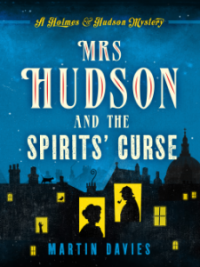Sherlock Holmes is the gift that simply goes on giving. We have read of him as a young man, and a man in his dotage. We have seen his mysterious brother at Mycroft centre stage too, and his arch villain Moriarty has been rehabilitated and given his own series. There have been books with Watson as the central character and a whole series with Lestrade to the fore, but now the least assuming resident of 221B Baker Street has a moment of fame. Yes, Mrs Hudson is the lead in this cosy mystery, after previously appearing in Mrs Hudson’s Case by Laurie R King.
To begin with, we meet a young orphan woman called Flotsam. She is certainly the result of a metaphorical shipwreck, as she has washed ashore in one of London’s most prestigious houses, where her life is made miserable by a dastardly butler, and several other sadistic below the stairs types. She is rescued by a sympathetic costermonger, and given into the care of the formidable Mrs Hudson, housekeeper at 221B Baker Street.
When an apparently terrified young man knocks at the detective’s door and seeks help, a case unfolds which involves a commercial venture gone wrong on the mysterious island of Sumatra. The game is rapidly afoot, but Mrs Hudson and her precocious apprentice are never far from the action, and usually a couple of steps ahead of the great detective. Watson is suitably dim, but heroic, and Scotland Yard’s finest are, as ever, dutiful, diligent, but always ready to jump to the wrong conclusion. Mrs Hudson uses her extensive web of connections to the great and not-so good across the capital, to make sure that her boss is gently corrected should he leap to the wrong conclusion.
There are a number of ways to approach a new novel involving Holmes. You can take the character, accept his fictional achievements, but write about him in your own style. We reviewed a good example of this in 2014, with Mitch Cullin’s A Slight Trick of the Mind. Another alternative is to copy faithfully the mannered narrative of Watson, known and loved by everyone who adores the original stories. Davies adopts the latter approach, and he is very good at it, but the problem is that the narrator is not the beloved physician. It is a teenage parlour maid who has been rescued from the clutches of a devious pimp, and has only recently learned to read and write, thanks to the tutelage of Mrs Hudson.
Leaving aside the improbability of the narrative style, we can turn to the plot. In one way, it is irrelevant, as we have the standard Sherlockian exotica of men tried, tested and failing in the far outposts of British Empire. We have poisonous snakes, the obligatory London fog, haunting violin music echoing around the rooms as the great man seeks inspiration, and mysterious folk who are not what they seem to be. We have come to expect this, and never accept things at face value. Flottie, with a nickname that will never catch on, is a quite delightful character, and I did enjoy the cheeky introduction of Arthur J Raffles, the gentleman thief and distinguished cricketer. Mrs Hudson is improbably omniscient, and gets to the nub of things much more quickly than her employer, but if you can accept these limitations, this is an unchallenging – but perfectly charming – read. It was first published in 2004, but has recently been released on Kindle.
For more great Sherlock Holmes books that weren’t written by Sir Arthur Conan Doyle, click here.
Canelo
Print/Kindle/iBook
£2.48
CFL Rating: 3 Stars










